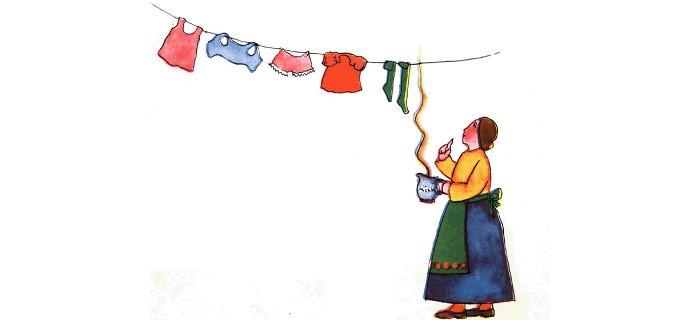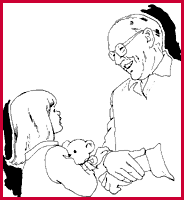Living with Parkinson's Disease

Four years ago, on Valentine's Day 1995, my father was diagnosed with Parkinson's disease. Back then, we didn't know what to expect--how fast would the disease progress? How would we know when it was time for him to begin heavier medication? How would we know when the disease was entering a new stage?
The uncertainty was the worst part of those early months, as we learned the hard facts about the disease, the treatments, and the symptoms we should expect him to develop as the disease progressed. In the time since then, we have all become "experts" to some degree--not experts in Parkinson's itself, since there seem to be as many variations in treatment as there are neurologists--but experts in dealing with the stresses, difficulties, and complications that my father faces every day of his life.
Even with our hard-won expertise, though, dealing with the disease isn't easy, and we often run into situations that confound us. One of the hardest things about caregiving is walking the fine line between doing too much and too little for a loved one, and it's a balance we struggle to maintain every day. We are often tempted to do too much for my father. He moves slowly now, and a task that would take my mother two minutes to perform often takes him twenty minutes.>
A basic daily task like unstacking and restacking the dishwasher is a laborious, exhausting job for him, but if we prevent him from doing it, or do it for him, he tells us that he feels "useless." The most important thing we can give him is our patience and tolerance; this is what allows him to retain his dignity.

Your parent can still do things he loves, and do them well. Nothing dreadful is going to happen if a task takes twice as long to get done.
We have all had to readjust the pace of our lives to accommodate my dad, much in the same way that I have adjusted to the rhythms of my two-year-old daughter. I can't make quick trips to the store any more; every trip I take with my child becomes a full fledged expedition. Every flower must be inspected, every bug must be watched on its long journey across the paving stones, every dog and cat must be greeted. I have learned that it's OK to take things more slowly. Nothing dreadful is going to happen if the trip takes two hours instead of one, and everyone will be happy.
We have had to change our pace in a similar way around my father--even if it takes him longer to do the tasks he wants to do, we have to constantly remind ourselves to be patient, and to let him get things done in his own time. We won't starve if we have to eat dinner half an hour later. We also have to remind him (tactfully) not to take on too much, since he often feels that he must prove himself by working as hard as he used to before his Parkinson's developed.
Part of the problem, aside from the neurological changes such as the tremor in his hands and arms, is the physical weakness and fatigue that he has to live with. The Parkinson's, combined with his angina, makes my dad very tired much of the time, and makes it difficult for him to finish some of the jobs he starts.
I think his worst moments occur when he has to admit defeat--when he has dragged something halfway up the stairs, and then lost the strength to take it the rest of the way, or when he has begun a "fix-it" project around the house, then discovered that he no longer has the manual dexterity to complete it. When things like that happen, which they do more and more frequently now, it's difficult for all of us. Much of his embarrassment is transmuted into grumpiness, or, even worse, depression and withdrawal into himself.
These are the lowest moments--the times when he feels like giving up, and when it is hardest for my mother to pull him out of his emotional slump, and to keep him active and engaged in daily life. He gets depressed because he feels useless, then the depression increases the fatigue, and the fatigue aggravates his physical weakness. It's a vicious cycle, and it affects the emotions and well-being of everyone in our family.

It will mean a lot to a granddaughter that her grandfather painted her room himself.
A little while ago, though, something happened that made me realize how much my father still can do for himself--and for us. The other week, I decided it was time to paint my daughter's room. She won't be sleeping there for a while yet, but I finally got motivated, found a color I liked, went out and bought the paint, and threw sheets over all the furniture in anticipation of a painting frenzy. I conveniently forgot the fact that I had never painted a room before.
For as long as I can remember, my father has been the family painter. From house to house, bedroom to living room to basement, and (when I left home) dorm room to apartment, my dad has always been there with a little tray of plaster to fill the holes, a piece of sandpaper to rub the walls down, and a ratty old sweatsuit to paint in. And, through all those years, I went about my business while he painted, bringing the occasional iced tea or cup of coffee, washing brushes when he asked me to, and generally keeping out of the way.
Some years had passed since his last painted room, though. All the symptoms of Parkinson's--the tremor in his hands, the deterioration of his balance and visual acuity, and his decreased energy level--make it difficult for him to do manual labor. Still, when he saw the paint can and the clean brushes, his face lit up. How could I tell him that I'd rather do it myself? How could I shield him from the potential embarrassment of results that might not meet his usual high standards? How could I do it by myself without knowing one end of a paint roller from the other?
Well, I couldn't, of course. I did manage to explain to him that I wanted to decorate the room myself. I managed to extract a promise from him that he wouldn't try to do it without me. And I managed to convince him that he could "supervise" the whole endeavor, and give me detailed instructions along the way.
Of course, it didn't work out that way. Within thirty seconds, I messed up. I accidentally touched the ceiling with the brush, and got purple paint all over the white "cottage cheese" stucco finish. You know, the kind of white ceiling that's impossible to match exactly no matter how hard you try. I was proud of my dad--he stayed very calm! He talked me through it for a few more minutes, watching me get myself into deeper and deeper trouble, and then made me come down so he could "demonstrate." Somehow, the demonstration never ended.
After my first few minutes of panic--fear that he would drop the paint can, fear that he would fall off the ladder, fear that it would all be too much for his heart--I gave up and just watched in amazement as the Parkinson's symptoms faded away. He finished painting the room at about 5:00 p.m. Sure, I helped out, mostly by doing some of the straight, flat stuff, and by bringing the occasional soft drink and cup of tea, but he did the bulk of the work, including all the stuff near the ceiling--the stuff that requires steady hands and good balance!
For that one day my father was his old self again--doing something he loved, and doing it well. He spent the day laughing and chatting with me as we painted, just like old times, back in the days before his health forced him off his feet and into the reclining chair. Unfortunately, he paid for his labor the next day, in soreness and tiredness. But he insists that it was worth the discomfort. Not only did he feel like himself again, for a brief and wonderful time, but he also created something lasting and beautiful.
I will treasure the memory of that day, and share it with Olivia when she is old enough to understand how much it really means to me that my Daddy--her Papa--painted the walls of her very own room.
Sonia Michaels is a writer, parent and homemaker, and the owner of The Magic Wardrobe, a home-based maker of handcrafted knitwear for children and nursing mothers. She lives in Victoria, BC with her husband, daughter and parents.
